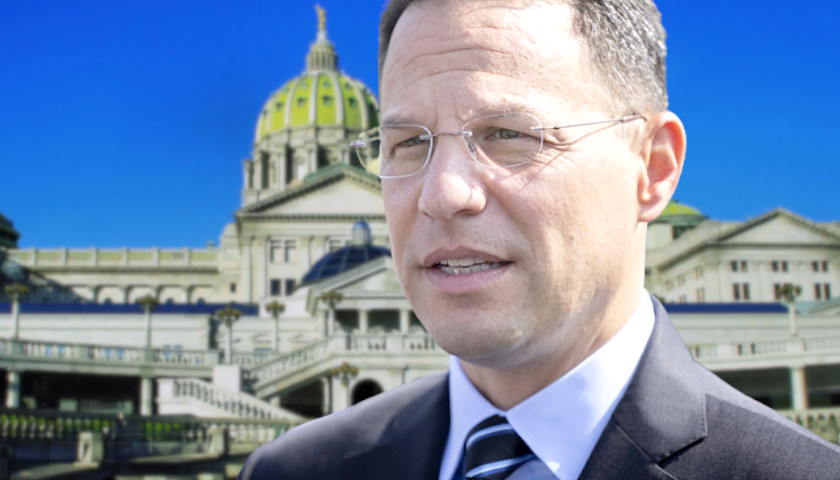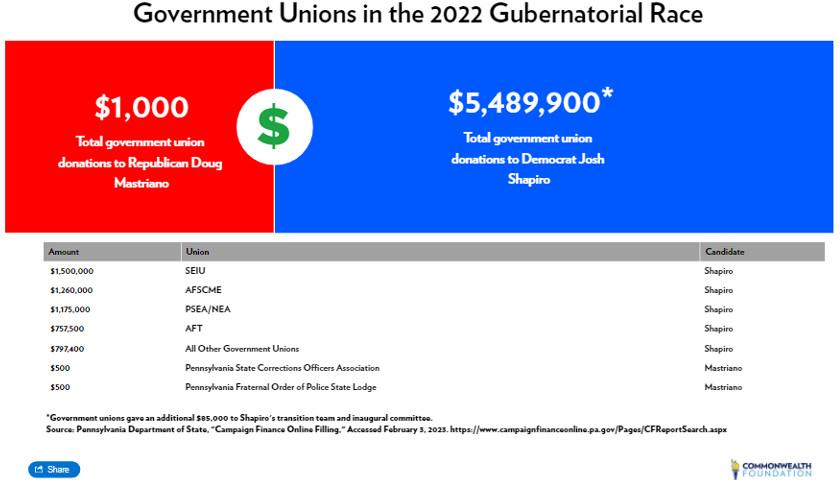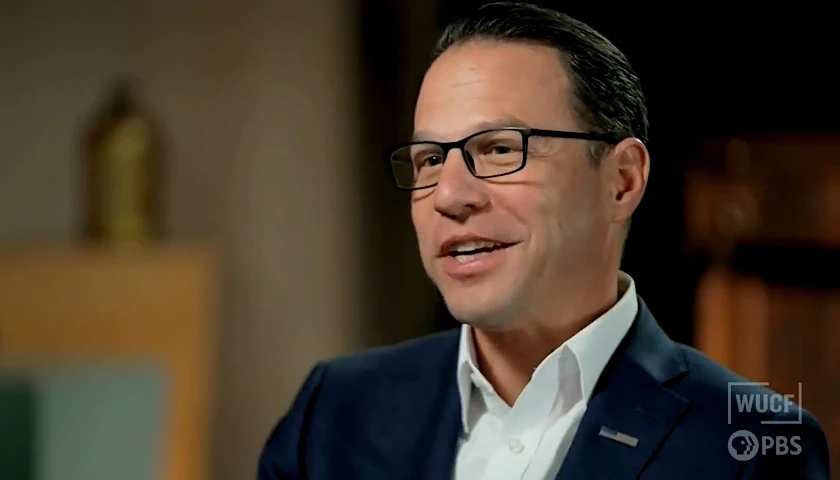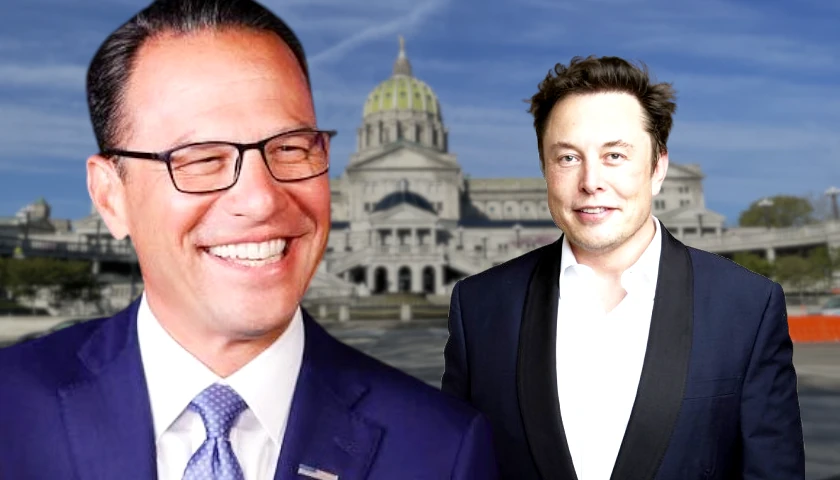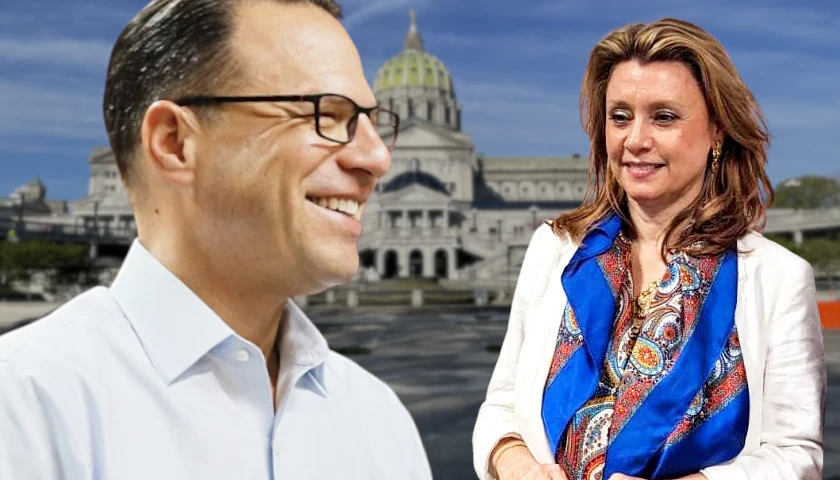Even as Pennsylvania’s public-sector unions suffer net losses of members and dues, these groups continue to ramp up political donations, according to a new analysis by the Harrisburg-based Commonwealth Foundation (CF).
According to the free-market nonprofit, spending from Keystone State government unions like the Pennsylvania State Education Association and the American Federation of State, County and Municipal Employees Council 13 totaled $6.34 million in the 2011-12 campaign cycle. That amount steadily rose over all gubernatorial and presidential cycles and reached a record $20.2 million in 2021-22.
This spending has accrued overwhelmingly to the benefit of Democrats and the causes they champion. Of the $5.86 million in donations from government-union political committees to statewide candidates during the last campaign period, Democrats received 99.6 percent. Of these organizations’ political expenditures in the commonwealth generally, 92.3 percent went to Democratic candidates or political interests espoused by them.
“At a time when government unions are losing membership due to partisan political spending, government union executives have really decided to double down on the partisan political spending,” CF policy analyst Andrew Holman told The Pennsylvania Daily Star. “The recent data shows this. They’re using millions of dollars collected with taxpayer resources to fund these political-advocacy activities and I think that, really, members of government unions need to be aware of where their money is going and what their unions are advocating for.”
Democratic Governor Josh Shapiro is a prime example of a Pennsylvania pol enjoying overwhelming advantage in this political-spending category. Government unions bestowed over $5.5 million on his 2022 campaign while state Senator Doug Mastriano (R-Gettysburg) garnered a mere $1,000 from these associations while running against him. Public-sector labor money was only slightly less lopsided between the candidates for lieutenant governor: Democrat Austin Davis raised $77,000 from these groups while his GOP state House colleague Carrie Lewis Delrosso got only $1,550 from them.
Such funding similarly proved helpful to Democratic candidates for the General Assembly. Last year, party members won 16 state House districts previously represented by Republicans; public-sector unions backed the victors in those races with a combined $571,875. All of the 10 state legislators most successful in getting these unions’ cash were Democrats.
Just as politicians can facilitate election victories by taking government unions’ money, Holman says, those organizations advance a policy agenda that their leadership wants to realize but that many ordinary Pennsylvania residents may find detrimental.
“Government unions spend this money to advocate against policies that are generally good for the taxpayers such as school choice, pension reform, other things like that,” he said. “Government unions don’t always have the taxpayers’ best interest in mind.”
All told, these groups spent more than $190 million on political activities over the last 15 years.
Apart from candidates and party organizations, many leftist nonprofits and political action committees received public-sector unions’ largesse. In the last election cycle, these included the liberal grassroots group Pennsylvania United ($250,000), the pro-abortion nonprofit Put Pennsylvania First ($100,000) and the progressive think tank the Keystone Research Center ($111,000).
CF noted last year that Pennsylvania public-sector labor groups lost well over 14,000 members and more than 26,000 other fee payers since the 2018 Janus v. AFSCME Supreme Court ruling forbade forcing government workers to join unions or pay them dues. But state law still affords these unions certain organizational advantages that boost their political power.
These groups continue to use the government payroll system to capture fees from members and they also enjoy a provision in the law permitting union members to resign only within a 15-day window at the end of a contract period. While litigation has extricated about 50,000 commonwealth staffers from this rule, it remains state policy.
Holman also said decertification is too arduous in cases when a majority on a government-office staff no longer want a union to represent them. He recommends Pennsylvania follow Wisconsin’s lead in adopting a reform that would require periodic recertification votes.
CF senior vice president Nathan Benefield added it is also important for workers to be properly informed of their free-association rights since Janus, something that doesn’t always happen when someone takes a public-sector job.
“Basically,” he said, “on the first day they come into work…, they get all the paperwork — here’s your tax forms, here’s your direct-deposit forms, and then, all of a sudden you get the union form… and they may, not knowing their rights, fill it out [and] have their dues deducted… without knowing what they’re signing on for because there is no provision to tell workers of their legal rights.”
Even post-Janus, some workers have found they needed to take legal action to end their union-dues payments. The Harrisburg-based Fairness Center successfully took one such case on behalf of Norristown State Hospital clerk Elizabeth McKeon from whom AFSCME continued to extract payment after she resigned from the organization. Fairness Center vice president and senior litigation counsel Danielle Susanj explained that while the judiciary has ruled compulsion of fee payments unconstitutional, provisions for such compulsion still appear in many contracts for school employees and other public staffers.
“It could get complicated for someone who doesn’t really know the state of constitutional law to know that in fact they don’t have to pay even though the contract says it right there in black and white,” she said.
– – –
Bradley Vasoli is managing editor of The Pennsylvania Daily Star. Follow Brad on Twitter at @BVasoli. Email tips to [email protected].
Photo “Gov Shapiro” by Gov Tom Wolf.

